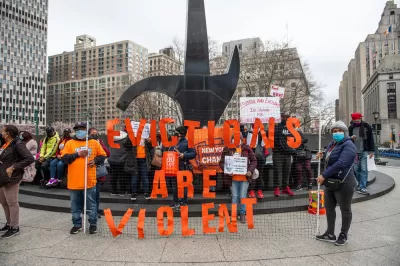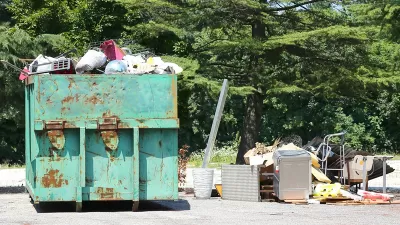HUD's new fair housing rule crucially overlooks the role of evictions in perpetuating residential segregation.

According to Devin Rutan and Renee Louis, "[t]he Biden Administration’s recent efforts to combat housing discrimination will fall short if they do not address eviction," commenting on the lack of eviction protections in HUD's reintroduced Affirmatively Furthering Fair Housing (AFFH) rule. "If the Biden Administration is serious about rooting out discrimination in rental housing and reducing segregation, it must incorporate eviction into its new fair housing rule."
The rule, which was introduced in 2015 and removed in 2018, "will require local governments to demonstrate that they are taking 'meaningful action' to promote fair housing markets, free from discrimination." But omitting eviction from the conversation leaves out a crucial element.
Nationwide, our research shows that Black Americans are significantly more likely to be evicted than their white peers. Nearly a quarter of Black tenants live in a county where the eviction rate for Black tenants is double the rate for white tenants. In Virginia, 60% of majority-Black neighborhoods have eviction rates greater than 10% — quadruple the national average. These racial disparities in eviction are even more extreme for Black women. And they're exactly the kinds of impacts the Fair Housing Act is meant to address.
Other factors that increase discrimination include family status, as "a family with children, all else being equal, is three times more likely to be evicted as another tenant who is also behind on the same amount of rent."
Despite the rule's intentions to promote fair housing, the authors conclude, "tenants with an eviction record, disproportionately Black women, are permanently locked out of most housing options. With millions of households facing eviction each year, any attempt by HUD at reducing segregation without explicitly addressing evictions will fall short."
FULL STORY: To Root Out Segregation, Biden Must Tackle Evictions

Alabama: Trump Terminates Settlements for Black Communities Harmed By Raw Sewage
Trump deemed the landmark civil rights agreement “illegal DEI and environmental justice policy.”

Planetizen Federal Action Tracker
A weekly monitor of how Trump’s orders and actions are impacting planners and planning in America.

The 120 Year Old Tiny Home Villages That Sheltered San Francisco’s Earthquake Refugees
More than a century ago, San Francisco mobilized to house thousands of residents displaced by the 1906 earthquake. Could their strategy offer a model for the present?

In Both Crashes and Crime, Public Transportation is Far Safer than Driving
Contrary to popular assumptions, public transportation has far lower crash and crime rates than automobile travel. For safer communities, improve and encourage transit travel.

Report: Zoning Reforms Should Complement Nashville’s Ambitious Transit Plan
Without reform, restrictive zoning codes will limit the impact of the city’s planned transit expansion and could exclude some of the residents who depend on transit the most.

Judge Orders Release of Frozen IRA, IIJA Funding
The decision is a victory for environmental groups who charged that freezing funds for critical infrastructure and disaster response programs caused “real and irreparable harm” to communities.
Urban Design for Planners 1: Software Tools
This six-course series explores essential urban design concepts using open source software and equips planners with the tools they need to participate fully in the urban design process.
Planning for Universal Design
Learn the tools for implementing Universal Design in planning regulations.
Clanton & Associates, Inc.
Jessamine County Fiscal Court
Institute for Housing and Urban Development Studies (IHS)
City of Grandview
Harvard GSD Executive Education
Toledo-Lucas County Plan Commissions
Salt Lake City
NYU Wagner Graduate School of Public Service





























